 |
Features |
 |
|
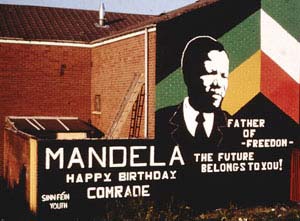
| ROCK's CONSCIENCE SPOTLIGHTS MANDELA |
 |
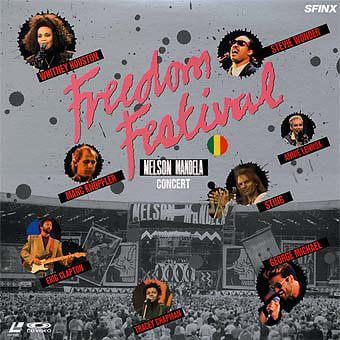 Back in 1984, British multiracial group The Special AKA had reached the UK top ten with a single produced by Elvis Costello and simply titled 'Nelson Mandela'. It had reminded the world that Mandela, a leader of the African National
Back in 1984, British multiracial group The Special AKA had reached the UK top ten with a single produced by Elvis Costello and simply titled 'Nelson Mandela'. It had reminded the world that Mandela, a leader of the African National
Congress, an organization banned in South Africa, had been in a South African jail since 1962 because of his opposition to apartheid.
Nelson Mandela had been imprisoned when he was in his early forties, more than a quarter of a century before, and he was still in prison on 11 June 1988 when a number of prominent pop and rock stars assembled to celebrate his 70th birthday.
Special AKA leader Jerry Dammers had not only written the song about Mandela, he had launched an organization called Artists Against Apartheid. In 1986, Dammers had helped to organize a free AAA concert, 'Freedom Beat', on London's Clapham Common and now planned to present a whole day show at Wembley Stadium, which could then be sold to worldwide television a la Live Aid. Jim Kerr of Simple Minds added his band's support, as did Bishop Trevor Huddlestone, President of the Anti-Apartheid Movement. With much assistance from Wendy Laister of PR specialists Laister Dickson, a bill began to be assembled which, apart from Simple Minds, also included Mark Knopfler of Dire Straits, undoubtedly one of the biggest acts in the world.
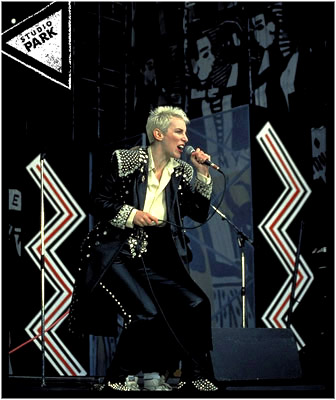 With Knopfler committed, filling the bill became much easier -George Michael agreed to appear before playing another London venue on the same day, and The Eurythmics actually called to offer their services. Whitney Houston, who had in the past refused to work as a model for companies with South African connections, was recruited by her concert promoter/agent Barry Marshall of Marshall Arts, and then BBC Television were approached.
With Knopfler committed, filling the bill became much easier -George Michael agreed to appear before playing another London venue on the same day, and The Eurythmics actually called to offer their services. Whitney Houston, who had in the past refused to work as a model for companies with South African connections, was recruited by her concert promoter/agent Barry Marshall of Marshall Arts, and then BBC Television were approached.
When the Corporation agreed to televise the show live, the credibility battle was virtually over.
Among the artists who eventually did appear were Dire Straits (with Eric Clapton as special guest), Sting, George Michael, The Eurythmics, Al Green, Joe Cocker, Natalie Cole, movie star Darryl Hannah, and a segment featuring Paul Young, Bryan Adams, Fish, The Bee Gees and Wet Wet Wet backed by a specially assembled super group led by Midge Ure, which included Phil Collins, Paul Carrack, Johnny Marr of The Smiths and Curt Smith from Tears For Fears.
In addition, UB40 (with guest Chrissie Hynde of The Pretenders), South Africa stars Hugh Masakela and Miriam Makeba, Whitney Houston (who had rescheduled a planned concert in Italy to perform at Wembley), Peter Gabriel, Little Steven (aka 'Miami' Steve Van Zandt, ex-Springsteen's E Street Band), Jerry Dammers & Friends,
Stevie Wonder and opera star Jessye Norman (who ended the concert with a moving' Amazing Grace'). Hosts Harry Belafonte, movie star Whoopi Goldberg, British comedians Michael Palin, Billy Connolly and Harry Enfield also gave time and talent to the cause. Quite a galaxy of stars.
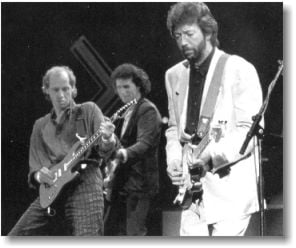 Ultimately, a good deal of money was raised for the Anti-Apartheid Movement and Jerry Dammers must have felt a lot better. But another artist, Tracy Chapman, also derived considerable benefit from the Mandela concert. Stevie Wonder's appearance was delayed for some hours because his carefully prepared backing tapes could not be found, and Chapman volunteered to return to the stage for a further set while Wonder's search continued.
Ultimately, a good deal of money was raised for the Anti-Apartheid Movement and Jerry Dammers must have felt a lot better. But another artist, Tracy Chapman, also derived considerable benefit from the Mandela concert. Stevie Wonder's appearance was delayed for some hours because his carefully prepared backing tapes could not be found, and Chapman volunteered to return to the stage for a further set while Wonder's search continued.
Chapman's debut album had already reached the Top 20 of the US LP chart, but had hardly registered in Britain. After the huge TV exposure she received from playing before an estimated worldwide audience of one billion viewers, her album deservedly topped the British LP chart, seemingly an instance of instant karma.
The Nelson Mandela 70th Birthday Tribute Concert, held on June 11th 1988 in Wembley Stadium in London, was watched not only by a capacity audience of 72,000 but also on television, by close on a billion people in over 60 countries of the world. The writer of this article, a worker for the British Anti-Apartheid Movement, helped to organise the event.
During the ten hours of the Mandela Birthday Concert, the attention of the world was focused, as perhaps never so powerfully before, on the evils of the apartheid regime, and, more especially, on the continued imprisonment of the acknowledged leader of the South African majority, and the thousands of other prisoners who languish in the gaols of Namibia and South Africa.
What an event it was - what a feast! From midday until ten in the evening, some of the greatest entertainers of the world gave themselves in praise of Nelson Mandela and what he stands for. In the dazzling, nonstop parade were jazz, rock and traditional groups; singers, instrumentalists, dancers, actors, comedians, from Europe, North America and Africa - indeed, there were famous jazz veterans and newer groups from South Africa itself. An American operatic soprano ended the programme.*
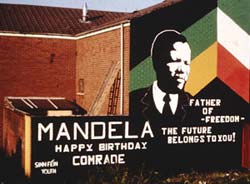 The origins of the concert dated back two years, to 1986, with the formation in Britain of Artists Against Apartheid. The organisers, Jerry Dammers and Dali Tambo, invited a host of artists to take part in a Freedom Festival on Clapham Common, in London. The march to Clapham Common before the concert was supported by 100,000 people representing almost all sections of British society. At the height of the afternoon, 250,000 were gathered on the great green Common to listen to the artists express their solidarity with the people of Namibia and South Africa through their words and music, and to hear the representatives of the ANC, of SWAPO and of the British Anti-Apartheid Movement.
The origins of the concert dated back two years, to 1986, with the formation in Britain of Artists Against Apartheid. The organisers, Jerry Dammers and Dali Tambo, invited a host of artists to take part in a Freedom Festival on Clapham Common, in London. The march to Clapham Common before the concert was supported by 100,000 people representing almost all sections of British society. At the height of the afternoon, 250,000 were gathered on the great green Common to listen to the artists express their solidarity with the people of Namibia and South Africa through their words and music, and to hear the representatives of the ANC, of SWAPO and of the British Anti-Apartheid Movement.
The Freedom Festival took place shortly after the state of emergency was imposed in South Africa. It was a new high point in mobilising public opinion in Britain. In spite of this, it was not a financial success. The Anti-Apartheid Movement, always short of funds, lost �80 000, was saved from bankruptcy only by an emergency appeal, and was therefore hampered at a time when maximum activity was required.
Mote to the point, 18 months after the Nelson Mandela 70th Birthday Concert, the man in whose honour it was staged was freed from imprisonment.
Features page


 Back in 1984, British multiracial group The Special AKA had reached the UK top ten with a single produced by Elvis Costello and simply titled 'Nelson Mandela'. It had reminded the world that Mandela, a leader of the African National
Back in 1984, British multiracial group The Special AKA had reached the UK top ten with a single produced by Elvis Costello and simply titled 'Nelson Mandela'. It had reminded the world that Mandela, a leader of the African National  With Knopfler committed, filling the bill became much easier -George Michael agreed to appear before playing another London venue on the same day, and The Eurythmics actually called to offer their services. Whitney Houston, who had in the past refused to work as a model for companies with South African connections, was recruited by her concert promoter/agent Barry Marshall of Marshall Arts, and then BBC Television were approached.
With Knopfler committed, filling the bill became much easier -George Michael agreed to appear before playing another London venue on the same day, and The Eurythmics actually called to offer their services. Whitney Houston, who had in the past refused to work as a model for companies with South African connections, was recruited by her concert promoter/agent Barry Marshall of Marshall Arts, and then BBC Television were approached.
 Ultimately, a good deal of money was raised for the Anti-Apartheid Movement and Jerry Dammers must have felt a lot better. But another artist, Tracy Chapman, also derived considerable benefit from the Mandela concert. Stevie Wonder's appearance was delayed for some hours because his carefully prepared backing tapes could not be found, and Chapman volunteered to return to the stage for a further set while Wonder's search continued.
Ultimately, a good deal of money was raised for the Anti-Apartheid Movement and Jerry Dammers must have felt a lot better. But another artist, Tracy Chapman, also derived considerable benefit from the Mandela concert. Stevie Wonder's appearance was delayed for some hours because his carefully prepared backing tapes could not be found, and Chapman volunteered to return to the stage for a further set while Wonder's search continued.
 The origins of the concert dated back two years, to 1986, with the formation in Britain of Artists Against Apartheid. The organisers, Jerry Dammers and Dali Tambo, invited a host of artists to take part in a Freedom Festival on Clapham Common, in London. The march to Clapham Common before the concert was supported by 100,000 people representing almost all sections of British society. At the height of the afternoon, 250,000 were gathered on the great green Common to listen to the artists express their solidarity with the people of Namibia and South Africa through their words and music, and to hear the representatives of the ANC, of SWAPO and of the British Anti-Apartheid Movement.
The origins of the concert dated back two years, to 1986, with the formation in Britain of Artists Against Apartheid. The organisers, Jerry Dammers and Dali Tambo, invited a host of artists to take part in a Freedom Festival on Clapham Common, in London. The march to Clapham Common before the concert was supported by 100,000 people representing almost all sections of British society. At the height of the afternoon, 250,000 were gathered on the great green Common to listen to the artists express their solidarity with the people of Namibia and South Africa through their words and music, and to hear the representatives of the ANC, of SWAPO and of the British Anti-Apartheid Movement.